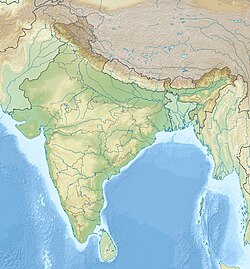Masol (paleontology)
 From Wikipedia - Reading time: 4 min
From Wikipedia - Reading time: 4 min
This article needs additional citations for verification. (March 2021) |
| Location | Masol, Punjab, India |
|---|---|
| Coordinates | 30°50′00″N 76°50′00″E / 30.83333°N 76.83333°E |
| Site notes | |
| Excavation dates | 1960s-present |
Masol is a paleontological-archaeological site in the Shivalik Frontal Range of the sub-Himalayan foothills of northwestern India, in the state of Punjab, a few kilometers north of Chandigarh. It dates from the end of the Pliocene. The fossiliferous formation called "Quranwala zone"(upper limit around 2.7 million years, lower limit 2.95 million years ago)[1] provides stone tools (choppers, flakes), some in situ with cut marks and percussion marks on fossil bones in the lower layers.[2][3][4] It represents the oldest paleontological record of hominin activities located outside of Africa.[5]
The majority of the site is composed of sandstone, sand, and silt, which, through time, has eroded due to wind and water action.[6] Such geological action has contributed significantly to the natural excavation of the area.
References
[edit]- ^ Chapon Sao, Cécile; Tudryn, Alina; Dambricourt Malassé, Anne; Moigne, Anne-Marie; Gargani, Julien; Singh, Mukesh; Abdessadok, Salah; Voinchet, Pierre; Cauche, Dominique; Karir, Baldev; Pal, Surinder (January 2024). "Magnetostratigraphy of the Pliocene Masol Formation, Siwalik Frontal Range, India: Implications for the age of intentional cut-marked fossil bones". Journal of Asian Earth Sciences. 259: 105884. Bibcode:2024JAESc.25905884C. doi:10.1016/j.jseaes.2023.105884.
- ^ "Pre-Quaternary hominin settlements in Asia: Archaeology, bio-lithostratigraphy and magnetostratigraphy evidences at Masol, Siwaliks, Northwestern India".
- ^ Malassé, Anne Dambricourt; Cauche, Dominique (September 2022). "Des traces de boucherie aux outils lithiques de Masol (Pliocène supérieur, Inde du Nord). Une approche psychomotrice de l'origine et de l'identité des hominiens". L'Anthropologie. 126 (4): 103070. doi:10.1016/j.anthro.2022.103070.
- ^ Dambricourt Malassé, Anne; Moigne, Anne-Marie; Singh, Mukesh; Calligaro, Thomas; Karir, Baldev; Gaillard, Claire; Kaur, Amandeep; Bhardwaj, Vipnesh; Pal, Surinder; Abdessadok, Salah; Chapon Sao, Cécile; Gargani, Julien; Tudryn, Alina; Garcia Sanz, Miguel (February 2016). "Intentional cut marks on bovid from the Quranwala zone, 2.6 Ma, Siwalik Frontal Range, northwestern India". Comptes Rendus Palevol. 15 (3–4): 317–339. Bibcode:2016CRPal..15..317D. doi:10.1016/j.crpv.2015.09.019.
- ^ Coppens, Yves (November 2014). "The Outstanding Universal Value of Human Evolution in Asia". In Sanz, Nuria (ed.). Human origin sites and the World Heritage Convention in Asia. UNESCO. pp. 9–14. ISBN 978-92-3-100043-0.
- ^ Gargani, Julien; Abdessadok, Salah; Tudryn, Alina; Chapon Sao, Cécile; Dambricourt Malassé, Anne; Gaillard, Claire; Moigne, Anne-Marie; Singh, Mukesh; Bhardwaj, Vipnesh; Karir, Baldev (February 2016). "Geology and geomorphology of Masol paleonto-archeological site, Late Pliocene, Chandigarh, Siwalik Frontal Range, NW India". Comptes Rendus Palevol. 15 (3–4): 379–391. Bibcode:2016CRPal..15..379G. doi:10.1016/j.crpv.2015.06.001.
 KSF
KSF